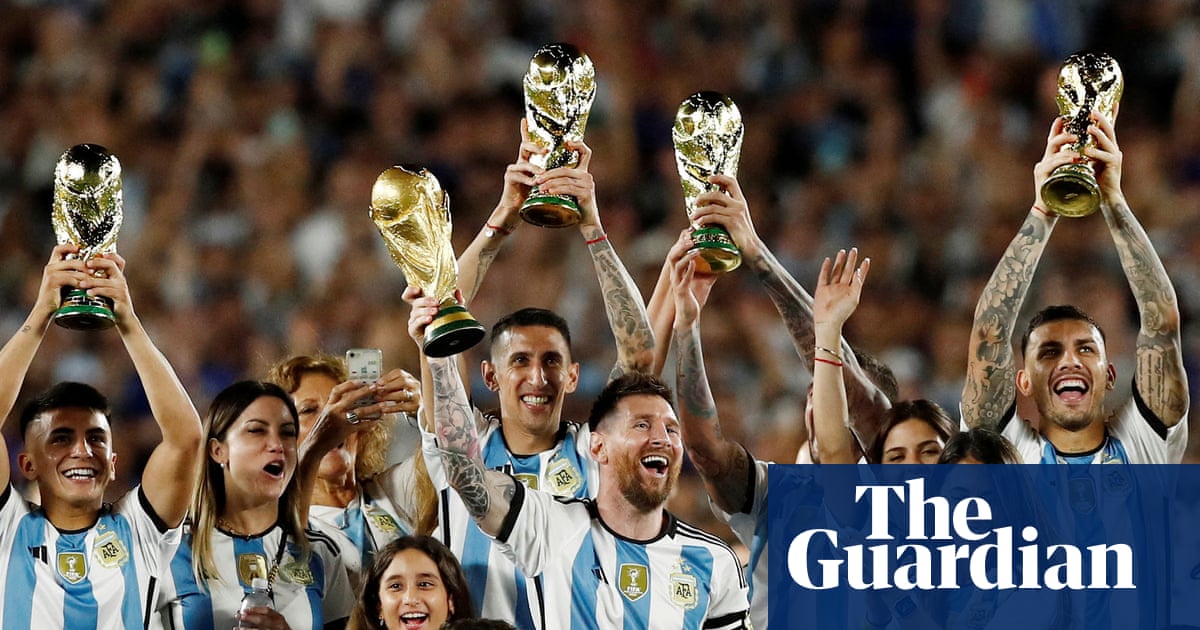
You would be forgiven for missing it last Thursday evening, amid the excitement of England’s win in Italy or the sacking of Julian Nagelsmann at Bayern Munich, but there was a brief moment, captured in Buenos Aires, where football turned its best trick, creating a moment so full of togetherness that one felt grateful just to watch, even if it was on a laptop or a phone a few thousand miles away.
Argentina started the international break with a friendly against Panama, the first game since their World Cup triumph, but the actual match served just as an excuse for a rousing pre-match sing-song, where fans bellowed out “Muchachos” into the ether at the Estadio Monumental.
The lyrics, written by a fan and adopted by a nation over the World Cup, were everywhere in Qatar, both in the stands and Argentina’s dressing room. Muchachos is a story of redemption – “how many years I cried for the finals that we lost” – and the rendition on Thursday was that of a dream realised, an organic outpouring of joy. There were no lyrics left on the seats, no choreography, no backing singer, no commentary, distractions or agenda. No Gazprom hoardings, no Salt Bae with a selfie stick, no cutaway shots of Gianni Infantino looking smug in the posh seats. It was a pure and astounding moment.
“Boys, now we’re dreaming again
I want to win it for the third time
I want to be world champion
And Diego, we can see him up in heaven
With Don Diego [Maradona’s father] and Tota [his mother]
Cheering on Lionel.”
What must it have felt like to be there, to sing that song, or to have it sung to you by 83,000 people? Lionel Messi, a veteran of such occasions, stands on the pitch with tears in his eyes, visibly clearing his throat, his arms thrown around his three sons, taking it in. Next to him, a blubbing Emi Martínez is a complete mess, his knees wobbling like Bruce Grobbelaar.
The song finishes, the match begins and everyone gently floats back down to earth. The fuzzy, ethereal atmosphere dissipates as attention turns to free-kicks and bad first touches. There is much to discuss, from Thiago Almada’s emergence on the international scene (the Atlanta United midfielder opens the scoring against Panama) to Martínez re-creating his controversial hip-thrusting celebration. Oh, and the narrative around Messi, of course. Everyone has an opinion on which club he should be playing for, or who he should passing to, or whether he should be playing the full 90 minutes (Messi inevitably scores a sublime 89th-minute free-kick to make it 2-0, his 800th career goal).
Many pondered whether Messi would retire from international duty after Qatar 2022, with nothing left to prove. But while the Argentina shirt used to weigh too heavily on his shoulders – defeats in the Copa América finals of 2007, 2015 and 2016 and the 2014 World Cup final saw him briefly retire in 2016 to focus on his club career with Barcelona – now the roles are reversed. Club has given way to country: a second successive Ligue 1 title with PSG would not mean an awful lot to most, and another Champions League exit to Bayern earlier this month means his time in France has largely been judged as underwhelming. With his PSG contract up in the summer, these are uncertain times.
On the international stage, Messi has played with a freedom and a smile since helping Argentina break the 28-year trophy drought at the 2021 Copa América. Lionel Scaloni’s team is structured around his talisman, who has less defensive responsibility but orchestrates almost every attack. It is a system, similar to the later Barcelona years, suited entirely to Messi’s needs, and requires a lot of sacrifice from others around him. Argentina have been rewarded, losing one match in the past 44 – against Saudi Arabia in the group stages of the World Cup – a record stretching back to July 2019.
Messi has not been shy in expressing his gratitude, both to Scaloni and his teammates. Answers in interviews are focused on the collective, and the PSG man recently bought 35 personalised gold iPhones for the World Cup squad and staff – at £175,000 a pop – as a present to commemorate their triumph. Messi, meanwhile, received the honour of having Argentina’s training base named after him at the weekend and was crowned as Fifa’s male player of year at The Best awards last month.
It has not been all smooth sailing of late. Gunmen threatened Messi earlier this month after attacking a shop owned by his wife’s family in Rosario, while previously unseen footage surfaced over the weekend of Messi’s World Cup spat with Wout Weghorst. Following a fiery quarter-final with the Netherlands in which Weghorst had scored twice, Messi was uncharacteristically hostile towards the striker, yelling “What are you looking at, idiot?”
The new footage now shows Messi also refusing to shake Weghorst’s hand, behaviour that Messi admitted was regrettable: “I don’t like what I did,” admitted the World Cup winner. “There was a lot of tension and it came out naturally.”
Not great for the optics, then, but only a small blip in what has been a sensational few months for Team Messi. Currently on 99 international goals, few would bet against him reaching another milestone on Wednesday, as Argentina take on 179th-ranked Curaçao in another friendly.
With the match selling out in less than a minute, another feverish atmosphere awaits in Santiago del Estero, the last chance for fans to celebrate their World Cup heroes before another qualifying campaign begins later this year. Whatever goals and songs are to come, it will take some doing to match the Monumental.












